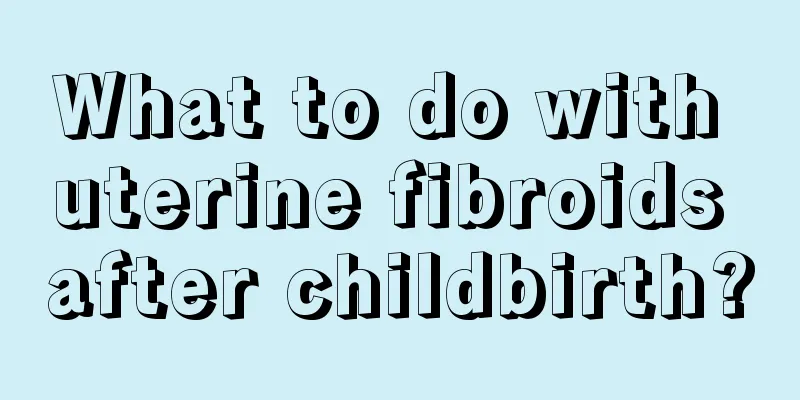What to do with uterine fibroids after childbirth?

|
Giving birth is the happiest moment for women. After all, after such a long period of hard work during pregnancy, they are finally seeing the results and are very relieved. However, women still cannot relax after giving birth and must pay attention to protecting their physical health, because there are many diseases that are easy to suffer from after giving birth, including some postpartum diseases. So the question is, what should I do with uterine fibroids after childbirth? If uterine fibroids are found during pregnancy, then we can say that the person must have had uterine fibroids before pregnancy, but they may have been smaller. As the hormone levels change during pregnancy, uterine fibroids grow rapidly. There is no need to worry too much if uterine fibroids grow or enlarge during pregnancy. We mainly need to look at the location of the fibroids, the number of fibroids, and the size of the fibroids. If the fibroid does not affect the growth of the fetus, we can wait and see and provide appropriate fetal preservation treatment during pregnancy. If during pregnancy, the fibroid grows too fast and it becomes relatively ischemic, a condition called red degeneration will occur. So the patient's main complaint is pain, abdominal pain. If the tumor is too large and the symptoms are too severe, it may cause the patient to have a late miscarriage or even a premature birth. If the tumor occurs during pregnancy, the current national opinion is that if the child's life is not in danger, the uterine fibroids can be left alone for the time being. Because as the gestational age increases, the uterus becomes more dilated. If you treat uterine fibroids at this time, there is a risk of uterine rupture. So during pregnancy, we mainly wait and see and treat the fetus. For uterine fibroids discovered after delivery, we need to see how long it has been. If the uterine fibroids are discovered on the 42nd day, we can wait. If it does not affect the contraction of the uterus and no complications occur, then we can observe. As she breastfeeds, her hormone level will drop, and the uterine fibroids will gradually shrink. Then, six months after delivery, we will look at the size of the uterine fibroids. If it is really large and affects uterine contraction or even causes anemia, or some complications, we can actively perform surgical treatment. At this time, whether we use open surgery or laparoscopy, it will be relatively easier to treat uterine fibroids. |
<<: Why does yellow discharge occur in the vagina?
>>: What medicine should I take for uterine inflammation?
Recommend
Breast tenderness and lower abdominal pain
Breasts are an important part of a woman's bo...
I had bleeding during intercourse half a month after the miscarriage
Miscarriage is a very painful thing for every wom...
Is polycystic ovary difficult to treat?
Polycystic ovary syndrome is a common female dise...
What is the girl fruit? How much does a pound of girl fruit cost?
Girl fruit is also called mushroom vine, foreign g...
How to choose medication during an acute migraine attack?
This is the 3213th article of Da Yi Xiao Hu In or...
Tea oil can eliminate stretch marks
Stretch marks are a concern for every new mother....
What causes vulvar itching after menstruation?
Women often experience vulvar itching after menst...
When does menopause start?
The time of menopause is calculated based on the ...
32 weeks head position
Everyone attaches great importance to children. C...
The most effective suppository for treating fungus
How to treat candidal vaginitis in regular hospit...
If your blood vessels are blocked, just walk a few steps and you will know! If you see these signs, be alert
As the saying goes, " A person's feet ar...
Women are most afraid of inflammation in this area during pregnancy
It is very troublesome for women to suffer from d...
What to do if you have lower abdominal pain during sex
Marital life is an important behavior to promote ...
What to eat during menstruation
Menstruation is something women have every month,...
Pregnancy palms and soles hot boy
What should you do if your palms and soles feel h...









